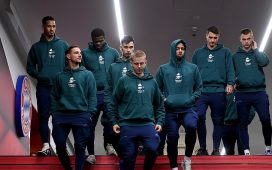Think of it as the Moneyball derby. Not so long ago, the idea a club could gain a vital edge using mathematical models – let alone employ a theoretical physicist or track key performance indicators (KPI) – would have left real football men choking on their meat pies and Bovril. But when Liverpool host Midtjylland in the Champions League on Tuesday, it will not only be a meeting between the champions of England and Denmark, but one between the twin vanguards of the sport’s analytics revolution.
Midtjylland became the movement’s poster child in 2014 when they started using deeper metrics – such as expected goals and pre-assists to an assist – to better evaluate player performances, find undervalued bargains and to shatter myths and easy narratives.
Many sneered when the unfashionable club from the centre of the Danish mainland – literally the middle of Jutland – also hired dedicated ball-striking and throw-in coaches and when their chairman, Rasmus Ankersen, promised to exploit inefficiencies in football. Winning three Danish Superliga titles in six years and qualifying for the Champions League for the first time this autumn have proved an effective riposte.
More recently, Liverpool have become Midtjylland’s big-budget half-brother. Their highly regarded research department, which includes an analyst with a doctorate in high-energy physics from Harvard, has earned significant credit for its recruitment of a string of top-quality players.
The bonds between the teams go further still, however. Two years ago, Jürgen Klopp headhunted Midtjylland’s throwing coach, Thomas Grønnemark. Since then, Liverpool’s statistics for retaining possession from throw-ins under pressure has shot up from 45.4% to 68.4% – taking them from one of the worst in the Premier League to the second-best in Europe. The team ahead of them? Midtjylland. “We also scored a lot of goals on long throws, then he went to Liverpool,” says Ankersen.

Midtjylland were thrashed 4-0 at home to Atalanta in their opening Champions League game and the bookies make them huge underdogs against Liverpool. But if they have a chance of making their hosts uncomfortable, it will probably come at set pieces, where they consistently ranked among the most successful teams in Europe.
It is the result – the club’s amiable captain, Erik Sviatchenko, explains – of analysts scrutinising thousands of free-kicks and corners and distilling them into an American football-style set-piece playbook of 20-25 routines. “Other clubs do this,” he says. “But when you see the data, 49% of all our goals last season were scored on set pieces. They are something our club and our owner, Matthew Benham, sees as a clear point for winning or changing games.”
Benham is the key figure in the Midtjylland story. Since taking a controlling stake in 2014 – two years after he did so in England at Brentford – he has used similar methods and models to those that helped him win millions as a professional gambler. His company, Smartodds, which analyses matches and players in dozens of leagues around the world, is also used by the club. It all amounts, says Ankersen, to a different way of thinking.
“A professional gambler seeks an edge over the market. He is not getting it right all the time. He’s looking for value. However, in football there are a lot of emotional mechanics that lead to people not making rational decisions – that sets them back.”
Ankersen says data is key because it helps Midtjylland get closer to the truth. “In football the stories we tell ourselves are often wrong,” he says. “Look what happens when a team goes through a bad set of results. The fans and the media search for a narrative to explain it. It’s the same when a team does well.
“Last season, for instance, we won the league by 14 points. People were saying we were doing fantastically well. But when you looked at the underlying data, we didn’t actually improve. Our closest competitors got worse. And once you’ve seen regression to the mean, again and again, you build up a big belief that this is the right way of doing things.”

The club even have a league table that shows where each team would be in the standings based on its underlying numbers, calculated by Benham’s team at Smartodds.
“Even if I were allowed, I couldn’t tell you the precise algorithm involved,” says the head performance analyst, Søren Bjerg. “But expected goals is in there, as well as how opponents have been doing and whether a team has changed its coach and so on. There are a lot of variables.”
These days almost every club has an analytics department. So how does a club stay ahead in a world where expected goals is now on Match of the Day and the easiest analytical advantages have already been exploited? Ankersen, understandably, does not want to give every secret away. But he says there are still inefficiencies – if a club knows where to find them.
“The Brazilian transfer market is really chaotic, for instance,” he says. “The value of a player can change by a few hundred percent over a couple of months. It’s a highly irrational and emotional market. If you can pick up players when they are on a low, there’s a lot of value.”
The signings of Paulinho, “an outstanding left back”, as well as Evander, who “on his day is the best player in the Danish league” after he lost his way at Vasco De Gama, shows Midtjylland practice what they preach.
Ankersen also believes that some clubs are still doing “simple things” wrong, like taking too many shots from locations where the probability of scoring is too low – and points to the growth of three-point shooting in basketball as an example of a sport that’s become more efficient. Meanwhile Sviatchenko says another edge comes through using sports psychologist BS Christiansen, a former elite soldier from the Danish Huntsmen Corps, who is “especially good when we need to get together and talk through things”.
“I don’t think a lot of what we do is rocket science,” says Ankersen. “But where we may be ahead still is that this is driven from the top. It’s not two interns in the basement working with data. The belief system comes from Matthew, from me and it filters down.”

Ankersen says one KPI coaches have been given this season is to increase the team’s Smartodds rating up by 0.5 goals. “So between us we are asking: ‘Where’s that improvement going to come from? Is it going to come from set pieces? Where are the low-hanging fruits defensively and offensively? In which phases of the game?’”
A knock-on effect is that Midtjylland keep chasing a second and third goal when they are 1-0 up, says Bjerg. Is that because your experts have worked out it is better not to sit on a lead? “Exactly,” he says. “But it also suits our style of play. Our mindset isn’t to sit back. The whole club DNA is about achieving things rather than protecting the stuff you have already got.”
Those watching on Tuesday will see Midtjylland play a 4-2-3-1 formation and like to press – much like Liverpool. “We also have a little bit of X-Factor on our day, especially with Pione Sisto and Evander,” says Ankersen.
Four years ago, Sisto was also a scorer when Midtjylland stunned Manchester United in the first leg of a Europa League last-32 tie. Toppling Liverpool, Ankersen says, would be another level again, but he is not entirely ruling it out. “It’s going to be very difficult,” he says. “We will need to play to our best, and have a bit of luck. But bigger miracles have happened in football.”








